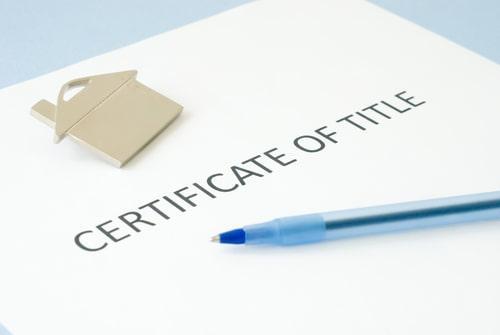What Happens if Your Spouse Dies and the Real Estate Was Only in Their Name?
 This article will discuss what happens if your spouse dies and the real estate title was solely in their name. In Illinois, couples often reside together in real estate where one spouse's name was not on the legal title. Mortgages are secured every day when one spouse's name was placed on a legal title because they had good credit and a high enough income to qualify for a mortgage.
This article will discuss what happens if your spouse dies and the real estate title was solely in their name. In Illinois, couples often reside together in real estate where one spouse's name was not on the legal title. Mortgages are secured every day when one spouse's name was placed on a legal title because they had good credit and a high enough income to qualify for a mortgage.
There are multiple reasons why someone may obtain a mortgage without their spouse being on legal title. The first reason is the person qualifying for a mortgage was the sole (or main) financial contributor in the household. Mothers often stay home and sacrifice their career options to take care of young children. Mothers (and fathers) also tend to work part-time or have flexible work arrangements, so they can cater to their children's extracurricular activities and school schedules. The cost of childcare also is a major consideration for parents. However, these family sacrifices can result in legal challenges, which are costly and harm families. People also may have inferior credit, mortgage foreclosures, or bankruptcy histories, all of which make it difficult to obtain mortgages as well.
Kendall County Quit Claiming Deed Lawyer: Adding a Spouse to Legal Title
Spouses often inquire about adding one spouse onto the legal title at closing. However, depending on the circumstances, the spouse may not be able to be added to the legal title at the house closing. In other instances, the family gets busy and forgets (or fails) to add the remaining spouse to the legal title. Adding a person to a legal title is called a "quit claim deed." The failure of both spouses to be on legal title creates problems. People falsely assume that when one spouse dies, the surviving spouse will automatically inherit all their real estate, personal, and financial assets.
In Illinois, intestate succession governs the distribution of property when a person dies without leaving a will or a designated beneficiary. See 755 ILCS 5/2-1. Probate law is the relevant law that addresses the appointment of an administrator or executor upon death when one has failed to leave a designated beneficiary or a testament.
As a rule, intestate succession is the process that governs the distribution of a person's assets upon death or is otherwise called a "decedent." A decedent’s estate consists of any debts and taxes or any assets that do not have a designed beneficiary. The probate process is administered and supervised by a court in the county where the decedent last lived. The estate of a person consists of assets in their name that was not jointly owed.
Retirement Assets, Pensions, and Designated Beneficiaries
Retirement assets are distributed consistently with one's designed beneficiaries. A designated beneficiary is a name of an individual or entity (such as a trust) that receives an inheritance of a person's retirement assets such as an IRA, 401(k), or other retirement assets. The purpose of designated beneficiaries is to distribute a person's assets to their loved ones upon death. If a person has a will and the will states that retirement assets are to be distributed to a specific person or persons contrary to the designated beneficiary on the specified retirement account, the designated beneficiary designation will prevail. A key issue in distributing property is making sure beneficiaries are designated in a certain manner to produce a result.
Designated beneficiaries result in problems when a person dies without a will or trust because, even though the decedent named beneficiaries for retirement assets or benefits, the way a person's retirement assets are labeled are the instructions their administrator will follow upon their death. Designated beneficiaries will bypass the probate process if the designated beneficiaries are alive and well. However, there are multiple instances where a designated beneficiary will be deceased, has developed a disability in life, or may not be the designated beneficiary a person desires upon death. Failure to update one's designated beneficiary status leads to estate conflicts and disputes among beneficiaries and heirs. This results in legal costs and attorney's fees to determine who is the rightful heir or beneficiary of these assets.
Divorces occur and divorced spouses fail to re-title their retirement assets to include new beneficiaries. Furthermore, people’s loved ones can die unexpectedly, which causes significant legal problems and legal risks. A testament ("will") is one method that people use to cover these legal gaps. A major downfall to a will is the requirement that a will must go through a court process called "probate court". Another problem is naming minor children or disabled adults as beneficiaries causing serious problems. Minor children cannot legally inherit without having a probate proceeding called "guardianship", which is a sub-court of probate court. Guardianship court is for disabled adults and minor children and the guardianship court addresses the issue of appointment of guardians and distribution of children's inheritances. Children's inheritances require annual accountings and the appointment of a guardian to legally protect the estate's inheritance in property and require annual accountings. The guardianship court will appoint a guardian to manage one's inheritance on behalf of minor children. The guardian of the estate is responsible for investing the minor's children's assets and safeguarding the funds for the support, education, and welfare of minor children under the age of eighteen years of age. Upon the child or children reaching the age of eighteen, the children will receive an outright distribution of funds without further court supervision or any financial constraints.
Unprobated Estates and Real Estate
An unprobated estate is an estate that does not go through probate court. Real estate is a major type of asset that fails to get probated. There is an exception in certain cases where the heirs and beneficiaries can cooperate with one another and finalize the sale of decedent’s real estate. The rules of descent and distribution govern unprobated estates because it explains who has rights as an heir and beneficiary. Unprobated estates may not occur when the beneficiaries designated in a will differ from the distribution process governed by Illinois intestate succession (unless the parties can agree to collaborate with one another). Where there are differences, these differences are best suited for probate court. The probate court can determine the rightful owner of real estate.
A significant problem arises when a spouse dies when one spouse’s name is on the legal title. The problem mostly arises when either a surviving spouse or the decedent’s children cannot cooperate to sell real estate together. The problem turns significant when there is a surviving spouse and stepchildren because they often have a natural distrust of one another.
Under Illinois underwriting guidelines, there is a process that must be followed to sell “unprobated estate” assets such as real estate. The cost of probates such as filing fees, attorney’s fees, and the time delay can be avoided in certain circumstances. These circumstances normally occur when the heirs and beneficiaries can prove their relationship to the decedent called an “affidavit of heirship” and can satisfy the title insurance company that no fraudulent activity is occurring. Navigating unprobated estate issues involving real estate requires precision and a real estate team that is qualified to assist you or your family members.
Call the Strong Real Estate Team at Peace of Mind Asset Protection to Navigate Your Unprobate Estate Interests
The team of Peace of Mind Asset Protection involves real estate attorneys and support staff with over 50 years of real estate and title insurance experience. Gateville Law Firm is a real estate law firm that owns Peace of Mind Asset Protection, LLC. Our support team has over 32 years of title insurance experience, which is significant when unprobated estate issues arise. Experience is important because we can flawlessly navigate the procedures and processes needed by the title insurance company. Call Gateville Law Firm today at 630-882-2467 or contact us through the online contact form located on the website.
Questions?
Contact Us Today
Call 630-780-1034 or fill out the form below to set up a free consultation today:
The use of the Internet or this form for communication with the firm or any individual member of the firm does not establish an attorney-client relationship. Confidential or time-sensitive information should not be sent through this form.
I have read and understand the Disclaimer and Privacy Policy.















